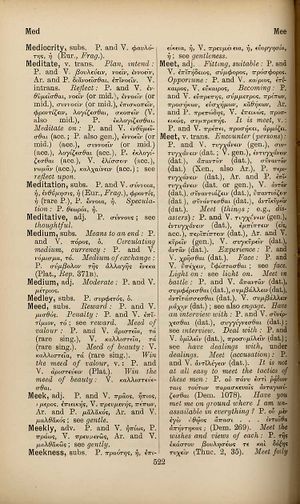meditate: Difference between revisions
μή μοι θεοὺς καλοῦσα βουλεύου κακῶς· πειθαρχία γάρ ἐστι τῆς εὐπραξίας μήτηρ, γυνὴ Σωτῆρος· ὦδ᾽ ἔχει λόγος → When you invoke the gods, do not be ill-advised. For Obedience is the mother of Success, wife of Salvation—as the saying goes.
m (Text replacement - "link={{" to "link={{") |
m (Text replacement - "}}]]" to "}}]]") |
||
| Line 1: | Line 1: | ||
{{Woodhouse1 | {{Woodhouse1 | ||
|Text=[[File:woodhouse_522.jpg|thumb | |Text=[[File:woodhouse_522.jpg|thumb | ||
|link={{filepath:woodhouse_522.jpg | |link={{filepath:woodhouse_522.jpg}}]]'''trans.''' | ||
<b class="b2">Plan, intend</b>: P. and V. βουλεύειν, νοεῖν, ἐννοεῖν, Ar. and P. διανοεῖσθαι, ἐπινοεῖν. V. intrans. | <b class="b2">Plan, intend</b>: P. and V. βουλεύειν, νοεῖν, ἐννοεῖν, Ar. and P. διανοεῖσθαι, ἐπινοεῖν. V. intrans. | ||
<b class="b2">Reflect</b>: P. and V. ἐνθυμεῖσθαι, νοεῖν (or mid.), ἐννοεῖν (or mid.), συννοεῖν (or mid.), ἐπισκοπεῖν, φροντίζειν, λογίζεσθαι, σκοπεῖν (V. also mid.), P. ἐκλογίζεσθαι. | <b class="b2">Reflect</b>: P. and V. ἐνθυμεῖσθαι, νοεῖν (or mid.), ἐννοεῖν (or mid.), συννοεῖν (or mid.), ἐπισκοπεῖν, φροντίζειν, λογίζεσθαι, σκοπεῖν (V. also mid.), P. ἐκλογίζεσθαι. | ||
Revision as of 10:11, 15 August 2017
English > Greek (Woodhouse)
trans.
Plan, intend: P. and V. βουλεύειν, νοεῖν, ἐννοεῖν, Ar. and P. διανοεῖσθαι, ἐπινοεῖν. V. intrans. Reflect: P. and V. ἐνθυμεῖσθαι, νοεῖν (or mid.), ἐννοεῖν (or mid.), συννοεῖν (or mid.), ἐπισκοπεῖν, φροντίζειν, λογίζεσθαι, σκοπεῖν (V. also mid.), P. ἐκλογίζεσθαι. Meditate on: P. and V. ἐνθυμεῖσθαι (acc.; P. also gen.), ἐννοεῖν (or mid.) (acc.), συννοεῖν (or mid.) (acc.), λογίζεσθαι (acc.), P. ἐκλογίζεσθαι (acc.), V. ἑλίσσειν (acc.), νωμᾶν (acc.), καλχαίνειν (acc.) , see reflect upon.
Latin > English (Lewis & Short)
mĕdĭtātē: adv., v. meditor.
Latin > French (Gaffiot 2016)
mĕdĭtātē¹⁴ (meditatus), à dessein, de propos délibéré : Sen. Const. 11, 3 || avec réflexion, précision : Pl. Bacch. 545 ; Mil. 40.
Latin > German (Georges)
meditātē, Adv. (meditatus, s. meditor), ausstudiert, alcis mores perquam m. tenere, recht innehaben, recht genau kennen, Plaut. Bacch. 545: ebenso novisse alcis mores m., Plaut. mil. 40: m. effundere probra, absichtlich, Sen. de const. sap. 11, 3: m. graviterque proferre, Donat. Ter. Andr. 1, 5, 50.

